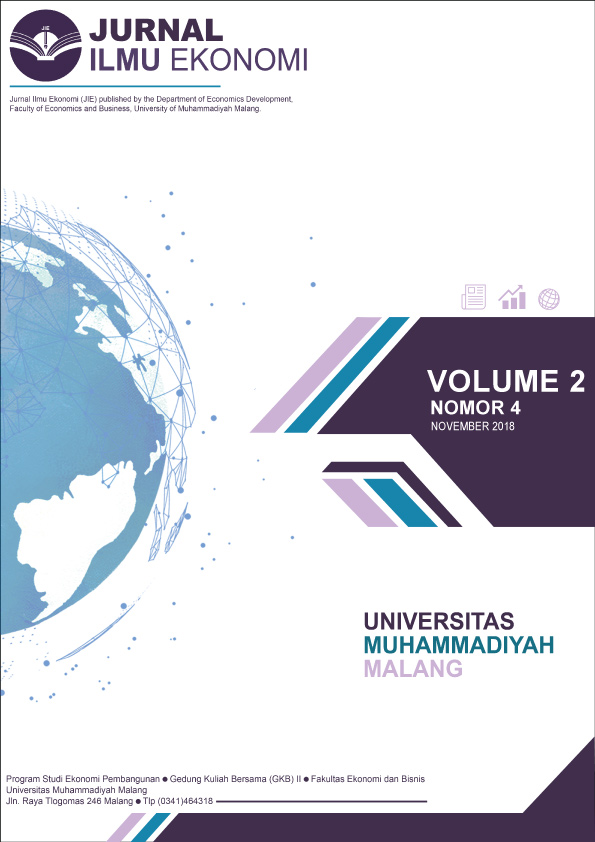ANALISIS SEKTOR EKONOMI UNGGULAN PADA KABUPATEN/KOTA DI PROVINSI SUMATERA SELATAN
DOI:
https://doi.org/10.22219/jie.v2i4.6247Abstract
This research aims to identify the leading sectors in South Sumatera Province. The analysis was conducted by comparing Gross Regional Domestic Product at Constant 2010 Price of Province of South Sumatra and Gross Regional Domestic Product at Constant 2010 Price Base of District in South Sumatera Province. The analysis model was Klassen Typology Analysis, and Location Quotient Analysis (LQ), Geographic Information System Analysis (GIS). The results of Klassen Typology analysis showed that the cities/regencies that belonged to fast-developed and fast-growing areas were Muara Enim and Palembang. The results of Location Quotient (LQ) analysis regencies of Ogan Komering Ulu showed that the potential to be the highest superior sectors between were the districts of Sounth Sumatera Province, they are agriculture, forestry and fishery sector, wholesale and retail trade sector; cars and motorcycles reparation sector, accomodation and refreshment provision sector, real estate sector, education services sector, Social Activities and Health sector, and other services sector. The results of Sistem Informasi Geografis (SIG) atau Geographic Informasi System (GIS) analysis showed that the agriculture, forestry and fishery sector the highest base sector in the city/district of Ogan Komering Ulu, Ogan Komering Ilir, Lahat, Musi Rawas, Banyuasin, Ogan Komering Ulu Selatan, Ogan Komering Ulu Timur, Ogan Ilir, Empat Lawang, dan Pagar Alam.
Keywords: Gross Regional Domestic Product, Agriculture Sector, Trading Sector, and Accommodation Sector
Downloads
References
Arifin, Z. (2010). Analisis perbandingan perekonomian pada empat koridor di propinsi jawa timur, 5(18), 161–167.
Arifin, Z. (2014). Modul Praktikum Ekonomi Regional. Laboratorium UMM.
Badan, P. S. 2016. (n.d.). Sumatera Selatan.
Ilmiyah, I. (2017). Analisis Penentuan Sektor Unggulan Pada Perekonomian Wilayah Kabupaten Pasuruan Skripsi. Universitas Muhammadiyah Malang.
Larasati, N. D. (2017). ANALISIS SEKTOR BASIS DAN SEKTOR UNGGULAN PEMBANGUNANNYA ( Studi Kasus di Kabupaten Magelang Tahun 2011-2015 ), 1–23.
Lestari, J. D. (2017). Potensi Pengembangan Ekonomi Daerah Di Kabupaten Bandung Barat Tahun 2011-2015.
Nur, A. F., & Nuraini, I. (2011). Analisis Potensi Ekonomi Sektoral Pada Empat Kabupaten Di Pulau Madura.
Nuraini, I. (2000). Analisis Sumber-Sumber Pertumbuhan Output Regional Kota Malang. Humanity, 5, 109–115.
Rasyid, A. (2016). Analisis Potensi Sektor Potensi Pertanian Di Kabupaten Kediri Tahun 2010-2014. Jurnal Ekonomi Pembangunan, 14(1), 99–111. https://doi.org/10.22219/JEP.V14I1.3889.G4310
Rinzani, A. (2015). Analisis Potensi Ekonomi Di Sektoral dan Subsektor Pertanian, Kehutanan, dan Perikanan Kabupaten Jember. Ekonomi Pembangunan, (2).
Satria, B. T. W. (2014). Analisis Pertumbuhan Ekonomi Dan Penetapan Sektor Unggulan Di Provinsi Jawa Timur Wilayah Timur Tahun 2010-2014, 11.
Suliswanto, M. S. W. (2016). Tingkat Keterbukaan Ekonomi Di Negara Asean-5. Neo-Bis, 10(1), 33–48.
Tarigan, R. (2015). Ekonomi Regional Teori dan Aplikasi Edisi Revisi. Bumi Aksara. Jak.
Published
How to Cite
Issue
Section
License
Authors who publish with this journal agree to the following terms:
- For all articles published in the JIE (Jurnal Ilmu Ekonomi), copyright is retained by the authors. Authors give permission to the publisher to announce the work with conditions. When the manuscript is accepted for publication, the authors agree to the automatic transfer of non-exclusive publishing rights to the publisher.
- Authors retain copyright and grant the journal right of first publication with the work simultaneously licensed under a Creative Commons Attribution-NonCommercial-ShareAlike 4.0 International License that allows others to share the work with an acknowledgement of the work's authorship and initial publication in this journal.
- Authors are able to enter into separate, additional contractual arrangements for the non-exclusive distribution of the journal's published version of the work (e.g., post it to an institutional repository or publish it in a book), with an acknowledgement of its initial publication in this journal.
- Authors are permitted and encouraged to post their work online (e.g., in institutional repositories or on their website) prior to and during the submission process, as it can lead to productive exchanges, as well as earlier and greater citation of published work (See The Effect of Open Access).
This is an open access article and licensed under a Creative Commons Attribution-NonCommercial-ShareAlike 4.0 International License








